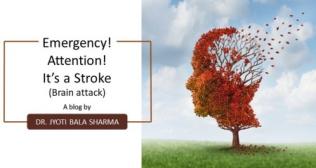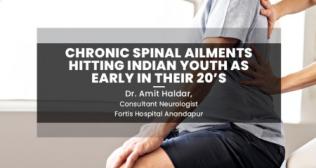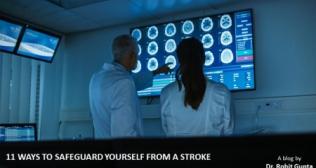
How to Prevent Brain Stroke in Winter: Simple Tips to Stay Fit
Introduction
A stroke, also known as a cerebrovascular accident (CVA), is a medical emergency that occurs when blood flow to a part of the brain is disrupted, depriving brain cells of oxygen and nutrients. The interruption, caused by an arterial blockage or rupture, leads to the death of brain cells and the impairment of many essential activities.
According to the World Health Organization (WHO), 1.5 crore people suffer from a stroke each year globally, of which 50 lakh people lose their lives and another 50 lakh are permanently disabled.
Given the prevalence of the condition, it is vital to understand its risk factors and take proper measures for prevention.
The dropping temperatures in winter pose several health challenges, particularly related to the cardiovascular system. Among these challenges, the risk of stroke looms larger, driven by a combination of environmental factors, lifestyle changes, other diseases, and a history of stroke.
Common Risk Factors of a Stroke During Winter
- Hypertension: When temperatures drop, the blood vessels constrict to conserve heat, thereby increasing blood pressure. Moreover, during winter, people tend to consume more salty foods due to increased appetite, which can further elevate the chance of raised blood pressure.
- Dehydration: Cold temperatures cause blood vessels to constrict, reducing blood flow to the skin and kidneys. As a result, the body loses more water through respiration and urine. Additionally, dehydration thickens the blood, making it more prone to clotting, thereby increasing stroke risk.
- Reduced Physical Activity: Winters limit outdoor activity, decreasing overall physical activity levels. It contributes to weight gain and reduces blood pressure control and cardiovascular health.
- Dietary Changes: Festive celebrations in winter are synonymous with dietary indulgences, including high-fat and high-sodium foods, and alcohol consumption, which raise blood pressure and cholesterol levels, increasing the risk of stroke.
- Respiratory Infections: Winter brings a surge in respiratory infections, including the flu, common cold, and RSV. Respiratory infections trigger inflammation and increase blood clotting tendencies, elevating the risk of stroke. Additionally, some respiratory viruses directly affect the heart and blood vessels, further increasing cardiovascular complications.
- Holiday Stress: The holiday season can bring about stress due to financial pressures, family obligations, and other factors. Stress can elevate blood pressure and contribute to unhealthy lifestyle choices, which are risk factors for stroke.
Tips to Prevent a Stroke During Winter
Stroke during the winter months can be prevented via lifestyle modifications and proactive healthcare measures. Here are some tips:
- Monitor Blood Pressure: Keep a regular track of your blood pressure during the winter and work with healthcare providers to manage hypertension through lifestyle changes, medication, or other interventions to prevent the risk of stroke.
- Stay Hydrated: Despite the cooler temperatures, stay hydrated during the winter to prevent dehydration. Try drinking water regularly throughout the day, even in the absence of thirst, and avoid excessive consumption of caffeinated or alcoholic beverages.
- Maintain Physical Activity: Find indoor exercise alternatives such as gym workouts, home exercises, or fitness classes and aim for at least 150 minutes of moderate-intensity aerobic activity per week, as health guidelines recommend.
- Eat a Balanced Diet: Practice moderation during holiday festivities and maintain a balanced diet rich in fruits, vegetables, whole grains, and lean proteins. Furthermore, limit the intake of high-fat and high-sodium foods, as they can contribute to hypertension and other cardiovascular risk factors.
- Manage Diabetes: Diabetes can significantly contribute to atherosclerosis (narrowing of the arteries) and can increase the risk of a stroke. Manage blood sugar levels with a healthy diet, exercise, and prescribed medicines.
- Reduce Stress: Practice stress-reducing techniques, such as meditation, deep breathing exercises, yoga, or engaging in enjoyable activities, to manage stress levels and reduce the risk of stroke.
- Get Quality Sleep: Quality sleep is essential in maintaining brain health. Chronic sleep deprivation has been linked to an increased risk of stroke and other cardiovascular conditions.
- Bundle Up Safely: Maintain a comfortable temperature indoors, and while venturing outdoors in cold weather, dress warmly in layers to prevent hypothermia and to keep blood vessels dilated. Pay special attention to extremities like hands, feet, and head, as they are more susceptible to cold-related issues.
- Seek Medical Attention for Respiratory Infections: If there are symptoms of a respiratory infection such as the flu or a cold, seek medical attention promptly. Follow healthcare guidelines, including getting vaccinated against the flu and practicing good hand hygiene, to prevent spreading infections.
- Quit Smoking: Quitting smoking is one of the most significant steps to reduce the risk of stroke. Smoking not only damages blood vessels but also contributes to hypertension and other cardiovascular diseases.
- Know the Signs of a Stroke: Familiarize yourself with the signs and symptoms of a stroke. If you or anyone experiences these symptoms, seek emergency medical attention immediately.
- Follow Medical Advice: If you have pre-existing medical conditions, such as atrial fibrillation, diabetes, or high cholesterol, follow your healthcare provider’s recommendations for managing these conditions. Proper management of underlying health issues is essential for reducing the risk of stroke.
The Signs of Stroke
Some signs indicative of a stroke are as follows:
- Drooping or numbing of face on one side
- Weakness or numbness in one arm and difficulty in raising both arms together
- Slurred speech
- Confusion and difficulty in finding the right words
- Trouble seeing in one or both eyes
- Severe headache
- Dizziness, loss of balance, or coordination
Recognizing the risk factors and taking proactive measures to mitigate them is crucial for maintaining optimal health during the winter months. The risk of stroke can be reduced by staying hydrated, staying active, eating a balanced diet, managing hypertension, and taking preventive measures against respiratory infections.
Popular Searches :
Hospitals: Cancer Hospital in Delhi | Best Heart Hospital in Delhi | Hospital in Amritsar | Hospital in Ludhiana | Hospitals in Mohali | Hospital in Faridabad | Hospitals in Gurgaon | Best Hospital in Jaipur | Hospitals in Greater Noida | Hospitals in Noida | Best Kidney Hospital in Kolkata | Best Hospital in Kolkata | Hospitals in Rajajinagar Bangalore | Hospitals in Richmond Road Bangalore | Hospitals in Nagarbhavi Bangalore | Hospital in Kalyan West | Hospitals in Mulund |
Doctors: Dr. Rana Patir | Dr. Rajesh Benny | Dr. Rahul Bhargava | Dr. Jayant Arora | Dr. Anoop Misra | Dr. Manu Tiwari | Dr. Praveer Agarwal | Dr. Arup Ratan Dutta | Dr. Meenakshi Ahuja | Dr. Anoop Jhurani | Dr. Shivaji Basu | Dr. Subhash Jangid | Dr. Atul Mathur | Dr. Gurinder Bedi | Dr. Monika Wadhawan | Dr. Debasis Datta | Dr. Shrinivas Narayan | Dr. Praveen Gupta | Dr. Nitin Jha | Dr. Raghu Nagaraj
Specialties: Heart Lung Transplant | Orthopedic |



















